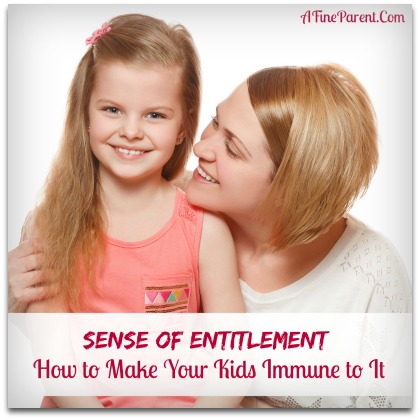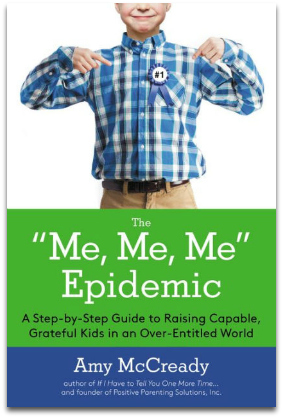 What would you do to make your child happy?
What would you do to make your child happy?
Quite a lot, no doubt.
But are you doing too much?
I know I am.
Not just in material terms, but in running after them, too. And I see that it makes my children happy. But I also see that in other ways it is inhibiting their growth as individuals.
My son is a natural giver. My daughter, more of a taker. No problem in itself–the world has space for all types of personality. It works on balance.
But the more I give, the more she expects. She is starting to feel a sense of entitlement. I see this on some occasions when I do say ‘No’. She looks confused, affronted almost.
And that’s partially my fault. Nature and nurture are coming together here to create the perfect storm.
Of course, there are some things my children are absolutely entitled to – My unconditional love. Nurturing. Respect. Food. Clothes. Shelter. A safe and happy home.
They deserve all of these things and more. I want them to know that they matter. That their contribution to the world matters.
The tricky part is learning where to draw the line between giving enough and giving too much.
I want my children to understand that the things they are entitled to are merely the foundation of their world. That as they grow, they have a responsibility to themselves and to others to give as well as take from life.
If they grow up with a sense of entitlement, thinking the world owes them something, then I’m not doing my job well. I’m not preparing them to take their place in life as a responsible, caring individual. And I’m holding them back from being the strong, capable, independent adults they deserve to be.
 The entitlement trap is easy to fall into – we all want to make our kids happy. But by making a few simple changes to the way we coach them to conduct themselves in the world can make all the difference and keep the sense of entitlement at bay.
The entitlement trap is easy to fall into – we all want to make our kids happy. But by making a few simple changes to the way we coach them to conduct themselves in the world can make all the difference and keep the sense of entitlement at bay.
#1 Instill an Attitude of Gratitude
 The phrase ‘Attitude of Gratitude’ has become so over-used it has begun to sound a little jaded. But there are plenty of scientific studies to support the idea that fostering gratitude leads to greater happiness and overall satisfaction in life – for adults and children alike.
The phrase ‘Attitude of Gratitude’ has become so over-used it has begun to sound a little jaded. But there are plenty of scientific studies to support the idea that fostering gratitude leads to greater happiness and overall satisfaction in life – for adults and children alike.
Gratitude is a such a powerful antidote to entitlement because it creates a pause: a moment of reflection that neatly plugs the gulf between the ‘wanting’ and the ‘getting’.
Without gratitude, receiving becomes empty and expected and is delivered with a heavy dose of entitlement. It’s the missing ingredient for harmony and balance.
As parents we can instill an attitude of gratitude by finding short, regular moments in everyday life to stop … and reflect. Done regularly, it becomes a welcome habit.
#2 Redefine Rewards
Modern thinking in regard to rewards and punishments can be viewed as contributing to the entitlement epidemic in our kids.
When rewards are over-used, they set up an expectation in our children that certain behaviors will entitle them to receive something they desire.
Alfred Adler was a renowned psychotherapist who founded the school of Individual Psychology in the late 19th/early 20th centuries. His impressive body of work has been recognized as being especially applicable to child development and provides some valuable insight regarding rewards and punishments. In particular:
Adlerian Theory draws an important distinction between Natural and Logical consequences:
Logical ones are those imposed by parents.
Natural ones are those that are a direct result of the child’s behavior.
Both have value, but natural consequences tend to be more effective because they avoid material rewards, and punitive measures that can result in power struggles.
In short – natural consequences encourage the child to become connected in the outcome of their actions – something entitled kids really struggle with.
We can help our children break out of the entitlement attitude by redefining rewards – away from the material ‘what I get’ approach, towards a focus on ‘how I feel, and how I make others feel’.
Let kids do things for the inherent pleasure of doing something, and doing it right, rather than the made-up rewards they receive from you.
#3 Establish Clear Limits and Rules
 “Mom, I want a hamster!” This is my daughter’s latest obsession.
“Mom, I want a hamster!” This is my daughter’s latest obsession.
“Okay sweetie, but you know it’s not just the furry little guy you need – he needs a home too.”
We were just about ready to add a pet to our family, but the want-it-get-it expectation did not sit well with me.
“I know, Mom” (How did she perfect that eye-roll thing already, she’s only 8?!)
“I made a list,” she continued.
And she had too, with everything any pampered furry rodent could possibly need.
“Okay,” I said. “Well, your birthday is a long way off, I guess you need to save up?”
This didn’t go down well with her.
My mini-negotiator tried every trick in the book to get me to stump up the cash. But I stood my ground. She retreated to her room, first to brood, then to work out a plan. She reappeared around an hour later.
“Can you please help me work out how much it will all cost, Mom?” she asked.
So, we went online – a cozy one-on-one connection moment that also provided a bonus in the form of a gentle lesson in safe internet use. We arrived at a figure.
While ruminating in her room she had already realized that pocket money alone would not cut it. She had prepared a list of chores she could do around the house for money.
Over the next few weeks, she regularly appeared and asked if she could ‘work’ for me. And I’m proud to say that after a month her ‘earnings’ generated the required funds. ‘Spot’ the hamster is the newest member of our family. We’re still working on a cleaning-out schedule, but that’s another story!
The point here is that saying ‘No’ doesn’t make you a bad parent. In some cases, it makes you a great one. Uttered with compassion and kindness, it is the perfect way to curb a sense of entitlement.
It’s important not to inadvertently make kids feel greedy for asking for something, or deprived or powerless or resentful when you refuse a request. The simplest way to achieve this is to acknowledge their want, context the priority, and help them to alight on a solution.
In my daughter’s case the solution was to embrace the concept of earned entitlement. She felt incredibly empowered by the route she took. She took responsibility for her own happiness, and experienced firsthand that hard work pays. It boosted her self-worth immensely.
And this doesn’t just work with material possessions. Setting clear limits and rules around what your children expect you to do for them is just as important. I won’t accept my kids calling out from the living room for me to bring a drink, for example – they know to come to the kitchen to ask and wait while I prepare it.
Accountability is key too – children need to be encouraged to respect the feelings and possessions of others and develop an attitude of putting things right when they are broken, in whatever form.
All these seemingly inconsequential actions and responses combine to create an innate understanding in our children that entitlement is less rewarding. Ultimately, they will choose to engage more actively of their own free will. And when they do, it’s inspiring.
#4 Actively Encourage Independence
 Amy McCready is a Positive Parenting expert and author of a wonderful book The “Me, Me, Me” Epidemic – A Step-by-Step Guide to Raising Capable, Grateful Kids in an Over Entitled World.
Amy McCready is a Positive Parenting expert and author of a wonderful book The “Me, Me, Me” Epidemic – A Step-by-Step Guide to Raising Capable, Grateful Kids in an Over Entitled World.
McCready believes that one of the biggest mistakes fueling the entitlement epidemic is parental eagerness to step in and smooth our children’s path. Basically, doing stuff for them when we don’t need to.
By removing obstacles from their path, we deny them the chance to experience discomfort, and with it the chance the develop resiliency.
Helicopter parenting may feel like the best way to help, protect and nurture our kids, but ultimately it serves only to make them ill-prepared for many of the challenges that life throws out.
Children who never have to shoulder responsibility never learn to be accountable for their actions. And this is an essential life skill that successfully keeps feelings of entitlement at bay.
By encouraging independence in our children at every opportunity we help them to grow into responsible, well-rounded adults who are able to deal with disappointment, and meet the challenges of life head on.
If you’re interested in learning more then check out this podcast interview with Amy McCready on Casey O’Roarty’s wonderful Joyful Courage website.
#5 Kindle a Fire for Giving
 Giving is a key element in immunizing your kids against an ever-creeping sense of entitlement. And it can really help to build a sense of self-worth and goodness in your child as they learn to appreciate the inner pleasure that can be derived from a selfless act.
Giving is a key element in immunizing your kids against an ever-creeping sense of entitlement. And it can really help to build a sense of self-worth and goodness in your child as they learn to appreciate the inner pleasure that can be derived from a selfless act.
Not all kids find giving easy, and it can help to find a context that is directly relevant to their own experience.
Here is an example:
As a family we regularly take short camping vacations. In chilly weather we kit out the kids in thermals and provide heat-reflecting roll mats for them to place under 4-season sleeping bags.
An hour from where we live is our nearest big city. One very dedicated lady there runs a charitable program that aims to provide the homeless with a rucksack of gear that will keep them warm and dry in the winter months. They rely on donations.
This year the children and I put together a pack to donate that included some of the gear the children have been using on our camping trips, but no longer need. They are pretty attached to some of this stuff though – it holds happy memories for them – and my daughter particularly finds it hard to let go.
We talked about homelessness, and looked at pictures and videos that brought its reality to life for her. She was shocked at the harshness of life on the streets.
It was the perfect exercise in giving, and I could see in my daughter’s eyes the feeling of pride as we handed over the items she had coveted for so long.
She got it. And her sense of entitlement on this particular issue crumbled before my eyes. It was a valuable lesson for her.
And for me… when we see our children as still-learning, still-growing little beings, and not label them as “selfish”, “greedy” or even “entitled brats” for that matter, we are in a much better position to guide and teach them to be beautiful, compassionate human beings.
Giving doesn’t have to be a huge gesture. It can be as simple as giving up your seat on the bus, sharing a pack of sweets, or taking time out from play to give Granny a call.
But many small acts combine to create an overall attitude of humility, that leaves entitlement adrift in its wake.
Are You Unintentionally Encouraging a Sense of Entitlement?
Self-reflection is always good for the soul, and I’m a firm believer that our own actions as parents have a significant impact on how our kids behave.
The 2-Minute Action Plan for Fine Parents
You are entitled to a few moments of reflection whenever you need it… So, ask yourself — is it time to:
- Introduce a daily gratitude pause – at bedtime, or perhaps before a meal, where you and your child each spontaneously think of one thing for which you are grateful?
- Stop before answering some of the many requests your child makes and ask yourself – am I fostering entitlement in the way I’m planning to reply? Is there another way I can do this?
- Implement a change to the way you use reward and punishment – are you creating a sense of entitlement by doling out rewards for every bit of good behavior? Do your punishments cause a disconnect between you and your child? How can you change the way you interact in those moments?
The Ongoing Action Plan for Fine Parents
It is important that we immunize our kids from a sense of entitlement before we send them out in the real world. Employ the principles described above at every opportunity and you will soon start to see a difference in your child’s attitude. Here’s a reminder of them with a convenient mnemonic BREAK:
Be Grateful – make gratitude a part of your daily conversations
Redefine Rewards – help your children connect with the outcomes of their actions rather than made-up rewards
Establish Limits and Rules – be prepared to say ‘No’, and create an alternative framework that enables your children to achieve their desires
Actively Encourage Independence – stop doing stuff for your kids that they can do for themselves
Kindle a Fire for Giving – model selfless giving, and encourage your children to generate and put into action their concepts of benevolence

Dear Ms Worden,
Thank you for the insight, your article was well written. I especially liked the part about unintentionally encouraging a sense of entitlement. My only complaint is that I wish it were a bit longer. I have lived in three different suburban communities in three different parts of the US, and the part of the problem that I have seen on a daily basis, that does not get enough recognition, is the self-reflection of the parents. As you said, our own actions have the biggest impact on our children. I see parents who loudly confront teachers and coaches for not doing enough for their child. They are the same parents that show frustration at having to wait in a line at the grocery store with their children, or aggressively drive because of some perceived slight to them in a parking lot or on the highway. They yell at waitresses in restaurants if everything is not to their standard of perfection. Etc.. This is not to be confused with teaching your children to stick up for themselves. What I witness on a daily basis are parents who’s actions demonstrate that they have a strong sense of entitlement themselves. (Why is it taking so long to get my latte? I paid for this and I want it to be perfect! You must give me better seats because mine are right under the air conditioner and are too cold! ) I see so many parents trying to tell people how this rule or that rule should not apply to them for some reason, instead of using creative problem solving skills to find a compromise or solution. I wish there were more parents who looked at how their own behavior is affecting their children. I love the link to the article by Samantha Bahandaker!
Thanks for your contribution Christine. And your examples of parental entitlement in action are a very vivid reminder of how important self-reflection is. In fact, I’m a firm believer that self-reflection has a massive part to play in all aspects of parenting. I, too, wish that more parents were ‘grown up’ about this. But it’s a tough call to turn the spotlight on yourself. It’s my hope that through sharing our experiences we can create a resource that is there for everyone to benefit from. If our words make just one parent stop and think, then I’m getting my happy on. Thanks for adding to that resource with your own insightful observations.